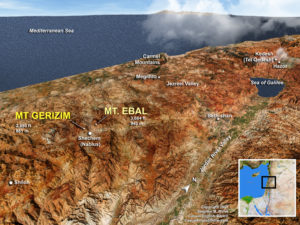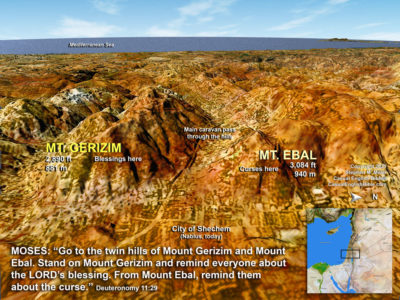I’M MAKING MAPS for Deuteronomy in the Casual English Bible and I wanted to show the twin mountains where Joshua and the Israelites had to read out loud the fine print in their contract with God:
Good news for following God’s law and bad news for breaking the law.
“Blessings” and “curses,” people often call them. But let’s call them “perks” and “consequences.”
The last time Moses got the people together he said, “It’s almost time for you to cross the Jordan River and claim the land the LORD your God is giving you.” He added, “When you get there, go to the twin hills of Mount Gerizim and Mount Ebal. Stand on Mount Gerizim and remind everyone about the LORD’s blessing. From Mount Ebal, remind them about the curse” (Deuteronomy 11:29, 31).
It didn’t take as long to read the blessings. They show up as 14 verses in Deuteronomy 28. The curses ran on for 53 verses.
Here’s a sampling of the perks of following the law and the consequences for breaking it.

Good news perks
- “Good things will happen to your city folks and country folks alike.”
- “Your families, fields, flocks, and herds will all start growing. It’ll be a remarkable blessing.”
- “You can count on baskets full of food. And you’ll have plenty of bread dough for your kneading bowl.”
- “You’ll come and go, but you’ll always take God’s blessing with you.”
- “You’ll get to be the head of the donkey, not the tail. You’ll lead the way. Everyone else will have to play catchup.” (28:3-6, 13)
Bad news consequences
- “You’re going to have some painful experiences in your families, fields, flocks, and herds. Making babies and growing crops aren’t going to go well.”
- “You’re doomed. You’ll come and go, but you’ll always take your doomed self with you.”
- “Here’s your life. You’ll get engaged to a woman that another man will rape. You’ll build a house that someone else will take from you before you get a chance to move in. You’ll plant a vineyard, but you’ll never taste a grape.”
- “You’ll have kids. But you don’t get to keep them. They’re headed to slavery.” (28:18-19, 30, 41)
The point
“These are consequences you’ll face for breaking the law and for refusing to obey the LORD your God. Your suffering won’t quit until you’re dead” (28:45)
The Jewish nation split in two after King Solomon died. The northern Jewish nation, known as Israel, got wiped off the map by Assyrian invaders from what is now northern Iraq in the 700s BC. The southern Jewish nation of Judah suffered the same in 586 BC when Babylonian invaders from what is now southern Iraq erased them from the map.
As the Bible tells the story, the Jewish people enjoyed the perks of following the law. But they later seemed to suffer the full extent of the consequences for breaking their agreement with God.
They have never fully recovered. And they never got back the land they once held.
The attempt in recent years to make gains by confiscating land of Palestinians whose families have lived in the region for centuries has become controversial even among local Israeli Jews. Many Israelis say it’s wrong to take land from a Palestinian family only to turn around and give it to a Jewish family.
It’s such an Old Testament thing to do, some say. But then, the Old Testament is the Jewish Bible.
One stunning line from Paul, a Jew, urged people to get over their differences:
“We’re not Jews or non-Jews. We’re not slaves or free folk. We’re not men or women. We’re one people, united in Jesus, the Messiah. If you’re one of the Messiah’s people, then you’re a descendant of Abraham. You’re part of the family. And you’re going to inherit what God promised” (Galatians 3:28-29).
Casual English Bible
Steve’s Bible YouTube Channel
More feature articles
Bible Gateway


Leave a Reply